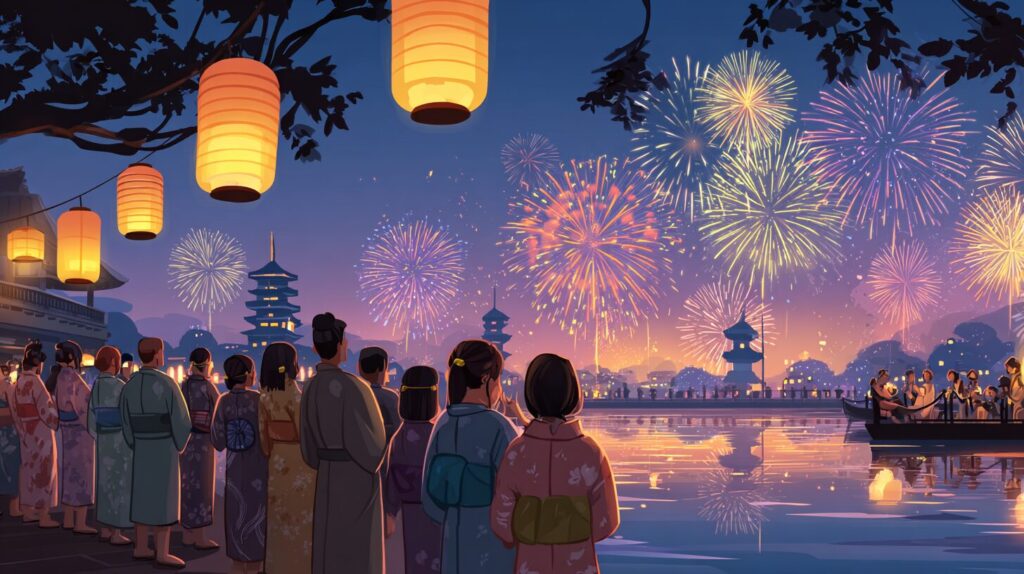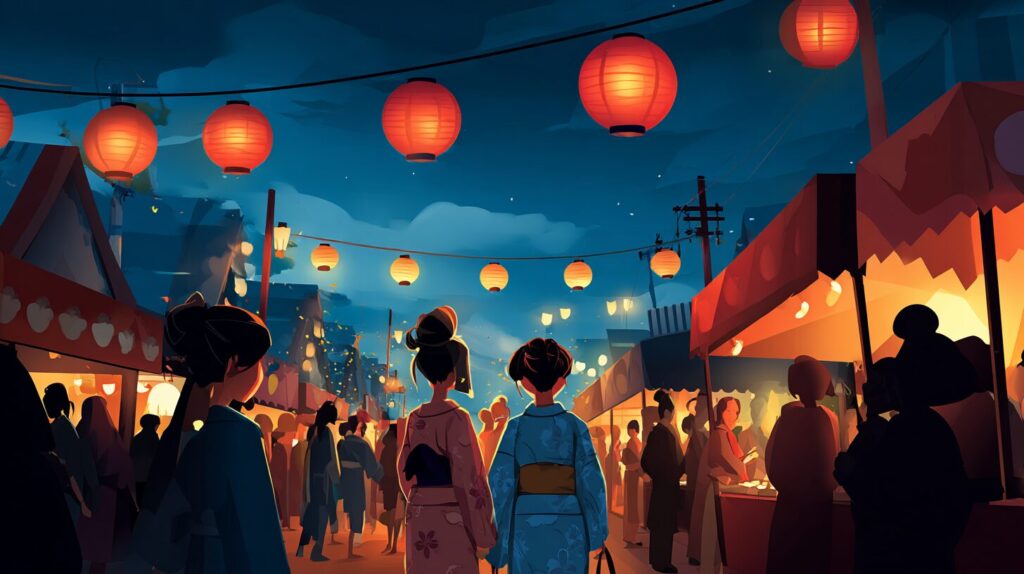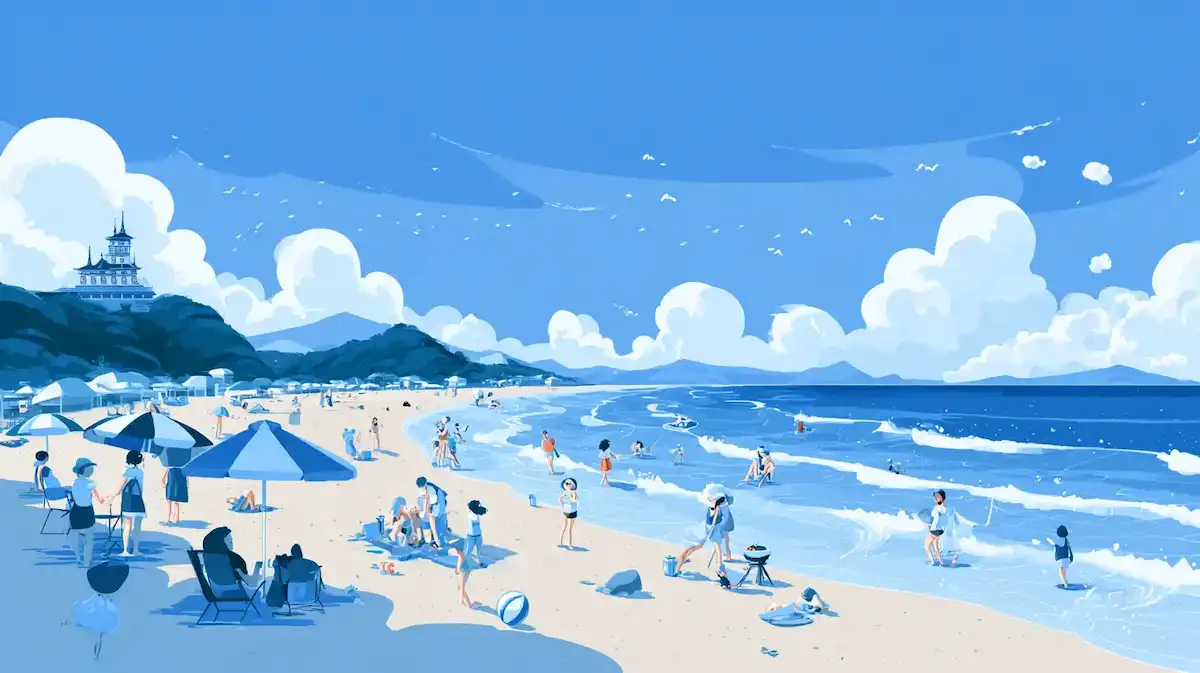日本の夏を英語で説明・紹介するための基本情報と、英会話に役立つ表現をシンプルでわかりやすい英語で紹介します。
英会話ダイアローグ・概要・10の質問を通して、日本の夏に関する英語表現を学びます。
英語
英会話ダイアローグを読む前に知っておくと良い前提知識と情報です。
- 日本の夏の基本的な気候と時期
- 6月から8月ごろで、特に7月・8月が本格的な夏
- 梅雨と呼ばれる雨の多い時期が6月中旬~7月中旬にある
- 夏本番は高温多湿で、30度を超える日も多い
- 夏の行事や伝統文化
- 各地で夏祭りが開かれ、浴衣を着て参加する人が多い
- 花火大会は日本の夏の大きなイベントで、多くの人が夜空の花火を楽しむ
- お盆(8月中旬)は先祖を供養する行事で、家族が集まる習慣がある
- 夏の食べ物と過ごし方
- そうめんや冷やし中華、かき氷、スイカなど、冷たい食べ物や飲み物が人気
- 海や山、川でのアウトドアも日本の夏ならではの楽しみ
- 暑さ対策
- 風鈴、うちわ、打ち水、すだれなど、昔ながらの工夫も使われている
- 旅行と観光の注意点
- 突然の激しい雨(ゲリラ豪雨)や台風が発生するため、天気予報の確認と対策が重要
- 高温多湿のため、熱中症になりやすい
2人が日本の夏について話しています。
高温多湿な気候、夏祭り・花火大会などの行事、夏の食べ物や過ごし方、暑さ対策などを話題にしています。
会話 / dialogue

Hey Key, it looks like the rainy season is almost over. I heard summer is just around the corner.

Yes, that’s right. After the rainy season, Japanese summer really begins. Are you looking forward to it?

I’m a bit excited, but I’ve also heard Japanese summers can be tough because of the heat and humidity.

That’s true. The temperature often goes over 30 degrees Celsius, and it feels even hotter because of the humidity. But there are a lot of fun things to do as well.

Like what? I want to experience something special this summer.

Well, one of the best things about Japanese summer is the festivals. You can see people in yukata, enjoy street food at the stalls, and watch big fireworks shows.

That sounds amazing! I’ve seen pictures of fireworks in Japan, and the crowds look huge. Do you have a favorite festival?

I love the local summer festivals in Tokyo, but if you have time, you should also try some famous ones in other regions, like the Gion Festival in Kyoto or Nebuta Festival in Aomori. Each one has a unique style.

I really want to wear a yukata and join in. Is it easy to rent one?

Yes, these days there are many places where you can rent yukata, especially around festival locations. It’s a great way to feel the summer spirit.

Besides festivals, what else makes Japanese summer interesting?

The food! Summer in Japan means eating cold noodles like somen and hiyashi chuka, or having kakigori—shaved ice with syrup. People also love watermelon and drinking barley tea.

That sounds perfect for the heat. Are there any unique traditions to stay cool?

Absolutely. Japanese people use fans, listen to wind chimes, and even sprinkle water on the ground to make the air feel cooler. These small traditions really add to the atmosphere.

I heard that cicadas make a lot of noise in summer. Is that true?

Yes, cicada sounds are like the background music of summer here. Some people find it nostalgic, while others think it’s noisy.

What about summer for tourists? Is it a good time to visit?

It’s great for experiencing traditional culture, but tourists should be careful about the heat and sudden heavy rains or typhoons. It’s important to drink water often and check the weather forecast.

Do people travel a lot in summer?

Yes, especially during Obon in August. Many families visit their hometowns to honor their ancestors and spend time together.

What kind of outdoor activities do people do?

Going to the beach, swimming, hiking in the mountains, camping, or having barbecues by the river—there are so many options.

Do you have any favorite summer memories?

I loved going to local festivals as a child, catching goldfish at the stalls, and eating kakigori with friends. The fireworks at night were always exciting.

I’d love to try those classic summer activities. Is there anything else I should know?

Well, schools have summer vacation, so you’ll see a lot of families and children enjoying themselves. Some places might be crowded, but the energy is really positive.

Thanks, Key. You make Japanese summer sound really special.

I think so too. Even with the heat, summer in Japan has a unique charm. I hope you’ll make some great memories this year!

I’m sure I will. Let’s go to a festival together soon!

That’s a great idea! Let’s plan it.
概要 / Overview
「日本の夏」について、理解を深めるための「英語での概要」です。
日本の夏

Introduction to Japanese Summer
Japanese summer is from June to August. It starts with the rainy season, called “tsuyu,” which lasts for about a month. After the rainy season, real summer begins, and the weather becomes very hot and humid. Summer in Japan is famous for its strong heat, high humidity, and many special events.
Festivals and Fireworks
One of the most exciting things about Japanese summer is the festivals. All over Japan, people enjoy “matsuri” (festivals) in their towns. Many people wear yukata, a traditional summer kimono, when they go to festivals. Food stalls sell many kinds of Japanese snacks. There are also big fireworks shows at night. These festivals and fireworks bring people together and create wonderful summer memories.
Summer Foods and Ways to Stay Cool
Japanese people like to eat cold foods in summer. Somen (cold noodles), kakigori (shaved ice with syrup), and watermelon are very popular. People also drink a lot of barley tea. To stay cool, people use fans, wind chimes, and sometimes sprinkle water on the ground. These traditions help people feel more comfortable in the hot weather.
Summer Activities and Nature
During summer, people go to the beach, swim in pools, and enjoy outdoor activities like camping and hiking. Children have summer vacation from school, so they spend time with family and friends. The sound of cicadas is everywhere in summer, making the season feel lively. Japanese summer is full of energy, tradition, and fun.
10の質問 / 10 questions
「日本の夏」について、理解を深めるための「英語での10の質問」です。
1: When is summer in Japan?
Summer in Japan is usually from June to August.
2: What is tsuyu?
Tsuyu is the rainy season in Japan. It lasts for about one month at the start of summer.
3: Why does Japanese summer feel so hot?
Japanese summer feels very hot because it is both warm and very humid.
4: What do people wear at summer festivals?
Many people wear yukata, which is a light cotton kimono, at summer festivals.
5: What kind of food do Japanese people eat in summer?
They often eat cold foods like somen noodles, kakigori (shaved ice), and watermelon.
6: What is a popular summer event in Japan?
Fireworks shows and summer festivals are very popular in Japan.
7: How do people try to stay cool in summer?
People use fans, drink cold drinks, and listen to wind chimes to feel cooler.
8: What sound is common in Japanese summer?
The sound of cicadas is very common in Japanese summer.
9: What do children do during summer in Japan?
Children have summer vacation, so they often play outside, swim, and do homework.
10: Why should tourists be careful in Japanese summer?
Tourists should be careful because it can be very hot, and sometimes there are heavy rains or typhoons.

和訳付
会話 / dialogue

Hey Key, it looks like the rainy season is almost over. I heard summer is just around the corner.
キー、もうすぐ梅雨が明けそうだね。いよいよ夏がやってくるって聞いたよ。

Yes, that’s right. After the rainy season, Japanese summer really begins. Are you looking forward to it?
うん、その通り。梅雨が終わると本格的な日本の夏が始まるよ。楽しみにしてる?

I’m a bit excited, but I’ve also heard Japanese summers can be tough because of the heat and humidity.
ちょっとワクワクしてるけど、日本の夏は暑さと湿気で大変って聞いたことがあるんだ。

That’s true. The temperature often goes over 30 degrees Celsius, and it feels even hotter because of the humidity. But there are a lot of fun things to do as well.
それは本当。気温が30度を超える日も多いし、湿度が高いからもっと暑く感じるんだ。でも楽しいこともたくさんあるよ。

Like what? I want to experience something special this summer.例えばどんなこと?この夏は何か特別なことを体験してみたいんだ。

Well, one of the best things about Japanese summer is the festivals. You can see people in yukata, enjoy street food at the stalls, and watch big fireworks shows.
やっぱり夏祭りが一番かな。浴衣を着た人がたくさんいて、屋台の食べ物も美味しいし、大きな花火大会も見られるよ。

That sounds amazing! I’ve seen pictures of fireworks in Japan, and the crowds look huge. Do you have a favorite festival?
すごく楽しそうだね!日本の花火大会の写真を見たことがあるけど、人がものすごく多いよね。キーはお気に入りの祭りがある?

I love the local summer festivals in Tokyo, but if you have time, you should also try some famous ones in other regions, like the Gion Festival in Kyoto or Nebuta Festival in Aomori. Each one has a unique style.
東京の地元の夏祭りも好きだけど、時間があれば京都の祇園祭とか青森のねぶた祭みたいな有名な地方の祭りもオススメだよ。それぞれ雰囲気が違って面白いよ。

I really want to wear a yukata and join in. Is it easy to rent one?
僕も浴衣を着て参加してみたいな。レンタルって簡単にできるの?

Yes, these days there are many places where you can rent yukata, especially around festival locations. It’s a great way to feel the summer spirit.
今は祭り会場の近くに浴衣のレンタル店がたくさんあるから簡単だよ。夏の雰囲気を味わうのにピッタリだよ。

Besides festivals, what else makes Japanese summer interesting?
祭り以外にも、日本の夏ってどんな面白いことがあるの?

The food! Summer in Japan means eating cold noodles like somen and hiyashi chuka, or having kakigori—shaved ice with syrup. People also love watermelon and drinking barley tea.
食べ物も魅力だよ。そうめんや冷やし中華、シロップをかけたかき氷は夏の定番。スイカや麦茶も人気だよ。

That sounds perfect for the heat. Are there any unique traditions to stay cool?
暑い夏にピッタリだね。他にも日本独特の涼み方とかあるの?

Absolutely. Japanese people use fans, listen to wind chimes, and even sprinkle water on the ground to make the air feel cooler. These small traditions really add to the atmosphere.
もちろん。うちわを使ったり、風鈴の音を楽しんだり、打ち水で地面に水をまいたりするんだ。こういう昔ながらの習慣が夏の雰囲気を作ってるよ。

I heard that cicadas make a lot of noise in summer. Is that true?
セミがすごくうるさいって聞いたことがあるけど、本当?

Yes, cicada sounds are like the background music of summer here. Some people find it nostalgic, while others think it’s noisy.
うん、セミの鳴き声は日本の夏のBGMみたいなものだよ。懐かしいって感じる人もいれば、ちょっとうるさいって思う人もいるかな。

What about summer for tourists? Is it a good time to visit?
観光客にとって夏は来やすい時期なの?

It’s great for experiencing traditional culture, but tourists should be careful about the heat and sudden heavy rains or typhoons. It’s important to drink water often and check the weather forecast.
伝統文化を体験するにはすごくいい時期だよ。でも暑さとか急な大雨、台風には気をつけないといけないね。水分補給と天気予報のチェックは大事だよ。

Do people travel a lot in summer?
日本の人たちは夏にたくさん旅行するの?

Yes, especially during Obon in August. Many families visit their hometowns to honor their ancestors and spend time together.
うん、特に8月のお盆の時期は家族で実家に帰省する人が多いよ。先祖を供養したり、家族で過ごしたりするんだ。

What kind of outdoor activities do people do?
どんなアウトドア活動が人気なの?

Going to the beach, swimming, hiking in the mountains, camping, or having barbecues by the river—there are so many options.
海水浴やプール、山でハイキング、キャンプ、川辺でバーベキューとか、いろいろあるよ。

Do you have any favorite summer memories?
キーは夏の思い出で特に好きなことある?

I loved going to local festivals as a child, catching goldfish at the stalls, and eating kakigori with friends. The fireworks at night were always exciting.
子どもの頃は地元の夏祭りに行って、屋台で金魚すくいをしたり、友達とかき氷を食べたりしたのが思い出かな。夜の花火もワクワクしたよ。

I’d love to try those classic summer activities. Is there anything else I should know?
そういう昔ながらの夏の遊び、ぜひやってみたいな。他に知っておいたほうがいいことってある?

Well, schools have summer vacation, so you’ll see a lot of families and children enjoying themselves. Some places might be crowded, but the energy is really positive.
そうだね、学校は夏休みだから、家族連れや子どもたちでにぎやかな場所も多いよ。ちょっと混むけど、その分すごく活気があるよ。

Thanks, Key. You make Japanese summer sound really special.
ありがとう、キー。日本の夏がすごく特別に思えてきたよ。

I think so too. Even with the heat, summer in Japan has a unique charm. I hope you’ll make some great memories this year!
私もそう思う。暑いけど、日本の夏には独特の魅力があるよ。今年もいい思い出を作ってね!

I’m sure I will. Let’s go to a festival together soon!
きっと素敵な夏になるよ。今度一緒にお祭りに行こう!

That’s a great idea! Let’s plan it.
いいね!ぜひ計画しよう。
概要 / Overview
日本の夏

Introduction to Japanese Summer
Japanese summer is from June to August. It starts with the rainy season, called “tsuyu,” which lasts for about a month. After the rainy season, real summer begins, and the weather becomes very hot and humid. Summer in Japan is famous for its strong heat, high humidity, and many special events.
日本の夏の紹介
日本の夏は6月から8月までです。最初は「梅雨」と呼ばれる雨の季節が約1か月続きます。梅雨が終わると、本格的な夏が始まり、気温がとても高くなり湿度も高くなります。日本の夏は強い暑さや高い湿度、たくさんの特別な行事で有名です。
Festivals and Fireworks
One of the most exciting things about Japanese summer is the festivals. All over Japan, people enjoy “matsuri” (festivals) in their towns. Many people wear yukata, a traditional summer kimono, when they go to festivals. Food stalls sell many kinds of Japanese snacks. There are also big fireworks shows at night. These festivals and fireworks bring people together and create wonderful summer memories.
祭りと花火
日本の夏で一番わくわくすることのひとつはお祭りです。日本中の町で人々は「祭り」を楽しみます。多くの人が浴衣という伝統的な夏の着物を着てお祭りに行きます。屋台ではいろいろな日本のスナックが売られています。夜には大きな花火大会もあります。こうした祭りや花火は人々を集め、すばらしい夏の思い出を作ります。
Summer Foods and Ways to Stay Cool
Japanese people like to eat cold foods in summer. Somen (cold noodles), kakigori (shaved ice with syrup), and watermelon are very popular. People also drink a lot of barley tea. To stay cool, people use fans, wind chimes, and sometimes sprinkle water on the ground. These traditions help people feel more comfortable in the hot weather.
夏の食べ物と涼の工夫
日本人は夏になると冷たい食べ物を食べるのが好きです。そうめん(冷たい麺)、かき氷(シロップをかけた氷)、スイカがとても人気です。麦茶もよく飲まれます。涼しく過ごすために、うちわや風鈴を使ったり、ときどき地面に水をまいたりします。こうした伝統は、暑い日でも快適に感じる助けになります。
Summer Activities and Nature
During summer, people go to the beach, swim in pools, and enjoy outdoor activities like camping and hiking. Children have summer vacation from school, so they spend time with family and friends. The sound of cicadas is everywhere in summer, making the season feel lively. Japanese summer is full of energy, tradition, and fun.
夏のアクティビティと自然
夏には人々は海に行ったり、プールで泳いだり、キャンプやハイキングなどのアウトドアを楽しみます。子どもたちは学校が夏休みなので、家族や友達と過ごします。夏にはどこでもセミの鳴き声が聞こえ、季節をいきいきと感じさせます。日本の夏はエネルギーと伝統、楽しさにあふれています。
10の質問 / 10 questions
1: When is summer in Japan?
日本の夏はいつですか?
Summer in Japan is usually from June to August.
日本の夏は、通常6月から8月までです。
2: What is tsuyu?
梅雨とは何ですか?
Tsuyu is the rainy season in Japan. It lasts for about one month at the start of summer.
梅雨は日本の雨の季節です。夏の初めに約1か月続きます。
3: Why does Japanese summer feel so hot?
なぜ日本の夏はとても暑く感じるのですか?
Japanese summer feels very hot because it is both warm and very humid.
日本の夏がとても暑く感じるのは、気温が高く、さらに湿度も高いからです。
4: What do people wear at summer festivals?
夏祭りで人々は何を着ますか?
Many people wear yukata, which is a light cotton kimono, at summer festivals.
多くの人が夏祭りでは「浴衣」という薄手の木綿の着物を着ます。
5: What kind of food do Japanese people eat in summer?
日本の人たちは夏にどんな食べ物を食べますか?
They often eat cold foods like somen noodles, kakigori (shaved ice), and watermelon.
そうめんやかき氷、スイカなどの冷たい食べ物をよく食べます。
6: What is a popular summer event in Japan?
日本で人気の夏のイベントは何ですか?
Fireworks shows and summer festivals are very popular in Japan.
花火大会や夏祭りは日本でとても人気のあるイベントです。
7: How do people try to stay cool in summer?
人々は夏にどうやって涼しく過ごしますか?
People use fans, drink cold drinks, and listen to wind chimes to feel cooler.
うちわを使ったり、冷たい飲み物を飲んだり、風鈴の音を楽しんで涼をとります。
8: What sound is common in Japanese summer?
日本の夏に多く聞かれる音は何ですか?
The sound of cicadas is very common in Japanese summer.
日本の夏にはセミの鳴き声がとてもよく聞かれます。
9: What do children do during summer in Japan?
日本の子どもたちは夏に何をしますか?
Children have summer vacation, so they often play outside, swim, and do homework.
子どもたちは夏休みがあるので、外で遊んだり、泳いだり、宿題をしたりします。
10: Why should tourists be careful in Japanese summer?
観光客は日本の夏にどうして注意が必要ですか?
Tourists should be careful because it can be very hot, and sometimes there are heavy rains or typhoons.
とても暑くなることがあり、時々大雨や台風もあるので、観光客は注意が必要です。

words & phrases
英会話ダイアローグと関連情報に出てきた単語・フレーズです(例文は各3つ)。

j just around the corner : フレーズ
意味:すぐ近く、間もなくやってくる。Very near in space or time; coming soon
(梅雨が明けて、夏が「もうすぐやってくる」という会話で使用)
例文:
- Summer is just around the corner.
「夏はもうすぐです。」 - The new shopping mall is just around the corner from here.
「新しいショッピングモールはここからすぐ近くです。」 - The test is just around the corner, so you should start studying.
「テストがもうすぐなので、勉強を始めたほうがいいよ。」
humidity : 名詞
意味:湿度。The amount of water vapor in the air
(日本の夏の特徴として「高温多湿」の湿度を表す)
例文:
- The humidity is very high in Japanese summer.
「日本の夏は湿度がとても高いです。」 - I don’t like hot weather with a lot of humidity.
「湿度の高い暑い天気は好きではありません。」 - The air conditioner helps reduce the humidity in the room.
「エアコンは部屋の湿度を下げてくれます。」
sprinkle : 動詞/名詞
意味:動詞:まく、少しずつかける 名詞:小雨、まき散らし。To scatter small drops or particles of something; a small amount that is sprinkled
(日本の夏の「打ち水」で、涼しくするために水を地面にまく行為を指す)
例文:
- People often sprinkle water on the ground to cool the air in summer.
「夏には涼しくするために地面に水をまくことが多いです。」 - She sprinkled some sugar on her pancakes.
「彼女はパンケーキに砂糖を少しかけました。」 - There was a sprinkle of rain this morning.
「今朝は小雨が降りました。」
cicada : 名詞 /sɪˈkeɪ.də/
意味:セミ(夏に大きな声で鳴く昆虫)。An insect that makes a loud sound in summer, common in Japan
(日本の夏の風物詩として、「セミの鳴き声」が季節感を表現する)
例文:
- The sound of cicadas is common in Japanese summer.
「日本の夏にはセミの鳴き声がよく聞こえます。」 - A cicada was sitting on the tree outside my window.
「窓の外の木にセミがとまっていました。」 - Many people feel nostalgic when they hear cicadas in the summer.
「夏にセミの声を聞くと懐かしく感じる人が多いです。」
charm : 名詞/動詞
意味:名詞:魅力、引きつける力 動詞:魅了する。A quality that makes something or someone attractive; to attract or delight someone
(日本の夏の「独特の魅力」や「特別な雰囲気」を説明する際に使用)
例文:
- Japanese summer has a unique charm.
「日本の夏には独特の魅力があります。」 - The old town still keeps its traditional charm.
「その古い町には今も伝統的な魅力が残っています。」 - She was charmed by the beautiful fireworks.
「彼女は美しい花火に魅了されました。」
